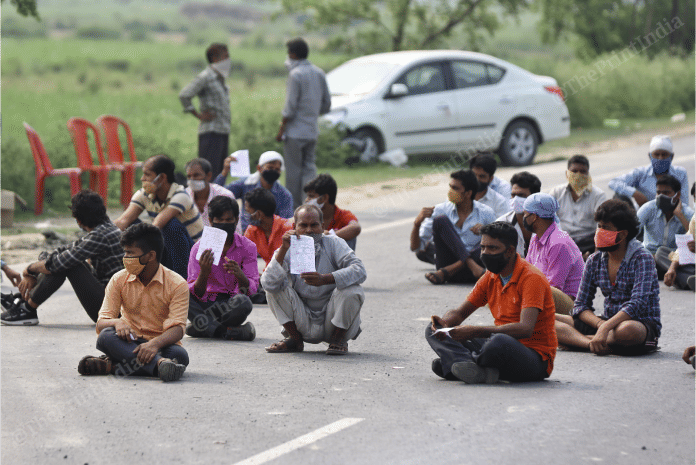Bareilly: With lakhs of migrant workers returning from cities to their villages in Uttar Pradesh due to the nationwide lockdown, employment under the Mahatma Gandhi National Rural Employment Generation Act (MGNREGA) has witnessed a surge in the state’s Bareilly district.
Bareilly’s chief development officer (CDO), Chandra Mohan, told ThePrint that currently, workers in 879 villages have been employed under this scheme.
“Around 47,000 workers are employed under MGNREGA, which also includes migrant labourers who have returned to their native villages. We are trying to generate as much employment possible for all the skilled, unskilled and semi-skilled workers,” Mohan said.
These workers receive a daily wage of Rs 202.
Following the influx, the Bareilly CDO said, the employment rate under the scheme has gone up five times.
ThePrint visited one such village, Bilpur in Faridpur Tehsil, where around 110 labourers have been employed under MGNREGA.
“Among the 110 workers are 35 migrant labourers who have come back home and have no other source of income,” said Jitendra Verma, Gram Pradhan. “They have been digging to construct this chak road (dirt road) that connects Khajuri village to Bilpur. It will prevent rain water from flooding the farms, enable people to access tractors for ploughing and make going from one village to the other easy,” he explained.
The work at this site, situated at the border of Bareilly, had started seven days ago and is almost completed.
Also read: ‘Will live on salt’ — UP, Bihar migrants refuse to return to cities, say were disowned by them
Pay cuts, but migrants have no choice
Twenty-five-year-old Dinesh Singh is another such migrant worker who has been employed through the MGNREGA scheme. Singh worked at a sweet shop in Badarpur, Delhi, but after Prime Minister Narendra Modi announced a nationwide lockdown on 24 March, which has since been extended twice times, he had to find a way to get back home.
“I walked from Badarpur to Ghaziabad, after which I boarded a Tata 407, a milk-carrying vehicle, and reached Rampur. The cops took us to be sanitised, conducted our health screening and we were put in quarantine for 14 days. Then they dropped us here,” he said.
Singh, who used to earn Rs 8,500 per month at the sweet shop, is the only bread earner of his family of four.
“I wasn’t feeling well in Delhi, and was also really scared of getting infected with Covid-19. Food and water were also scarce, so I came back here. The food in the sweet shop had started decaying… There wasn’t anything left to hang onto there. Survival became really tough. Even if I go back, for the sake of money, it will be only after a year,” he said.
Ved Prakash, who used to work as a railway labourer in Old Delhi, left on 27 March and walked for 10 days straight to reach Bilpur. “I didn’t get any food or water for two-three days, but I didn’t stop,” he recalled. Now, Prakash and his father both work at the same site under MGNREGA.
“I used to get Rs 350 per day there (Old Delhi), but have no other source of income, no other option to get food on our plate than to work here,” said Prakash has been working at the site for five days now.
The block development officer (BDO) MI Khan told ThePrint that the process of payment takes seven to eight days after the creation of muster rolls, a labour attendance register.
“Muster rolls are created after a week of work, the payment is then processed through direct bank transfers. This process takes another seven to eight days,” Khan said. He also added that these workers will be employed again at another site.
“Migrant workers and other village labourers are coming every day to our office. Migrant workers who don’t have job cards are being provided with job cards,” Khan said, adding that these new job cards are being created within a day.
The CDO also said that work at panchayat bhavans and anganwadi bhavans as well as government school renovations has started, providing further employment opportunities to migrant labourers under Operation Kayakalp, a UP state government initiative.
“We are trying to start work on community toilets, which will further increase employment opportunities for migrant labourers and others in the state who are out of work due to lockdown,” said Mohan. Other employment strategies are also being discussed to increase employment,” he added.
Also read: No food, living under asbestos roof with no work: Why Surat workers are angry, ‘desperate’






